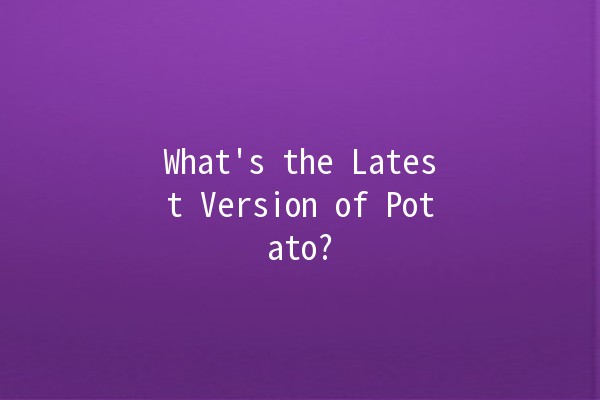In today's fastpaced tech world, keeping up with the latest software updates is crucial. Among the many programming languages and frameworks available, Potato stands out due to its unique features and userfriendly interface. This article explores the latest version of Potato, diving into its new capabilities, functionality, and practical tips to enhance productivity.
What is Potato?
Potato is a versatile opensource programming language designed for developers looking to create highperformance applications. With an emphasis on simplicity and efficiency, it has gained popularity for its clean syntax and powerful features. Whether you're building web applications, mobile apps, or embedded systems, Potato offers a plethora of tools to speed up your development process.
Recent Updates in Potato
The most recent version of Potato has introduced several significant updates that enhance functionality and user experience. Here are the key highlights:

The latest version of Potato has undergone substantial performance optimization. This update offers faster execution times and reduced memory consumption, allowing developers to create more efficient applications.
Potato now comes with an extended library collection, providing developers with more prebuilt functions and tools. This makes it easier to access common functionalities without needing to reinvent the wheel.
With a focus on integration, the latest version ensures better compatibility with various platforms and languages. This facilitates smoother workflows for developers who work in diverse environments.
New and improved developer tools have been introduced, aimed at streamlining the coding and debugging processes. These tools enable quicker testing, code validation, and error detection, leading to a more efficient development cycle.
Potato's community has continually expanded, leading to more shared resources and documentation. This encourages learning and collaboration among developers, making it easier for newcomers to get assistance and share knowledge.
Productivity Boosting Tips with Potato
To maximize your productivity while using Potato, consider the following five tips. Each tip includes a brief explanation and practical examples of how to implement them.
Explanation: Always take advantage of Potato's builtin libraries. They save time and effort in coding common functions.
Example: If you need to generate random numbers, instead of writing a function from scratch, simply call the library’s `Random` generator. This approach reduces bugs and speeds up your development time.
Explanation: Use version control systems like Git to track changes and collaborate with others efficiently.
Example: By initializing a Git repository in your project folder, you can commit code changes, switch branches for new features, and revert to previous versions if something breaks.
Explanation: Potato’s debugging tools can help identify and fix errors in your code quickly.
Example: Utilize the builtin debugger to run your code step by step. It allows you to inspect variables at different stages, making it easier to pinpoint issues.
Explanation: Engaging with other developers online can provide insights and assistance.
Example: Join forums or social media groups dedicated to Potato. Sharing experiences with peers can lead to discovering new tips, troubleshooting advice, and best practices.
Explanation: Regularly consult the Potato documentation to stay informed about new features and updates.
Example: Make it a habit to review release notes after updates. This practice keeps you aware of any alterations in syntax or functionality, ensuring your projects always implement the latest improvements.
Frequently Asked Questions
What is Potato primarily used for?
Potato is a programming language designed for multiple applications, including web development, mobile app creation, and embedded systems. Its flexibility allows developers to build various types of software efficiently.
How does Potato compare to other programming languages?
Potato differentiates itself through its simplicity and intuitive syntax, making it easier to learn compared to other languages like C++ or Java. Additionally, its rich library ecosystem accelerates the development process.
Is there a strong community support for Potato?
Yes, the Potato community is expanding rapidly. Developers actively participate in discussions, contribute to libraries, and offer support on forums and GitHub, providing a wealth of resources for both new and seasoned developers.
What tools are available for Potato?
The Potato ecosystem includes numerous tools for development, including editors, debugging tools, and build tools. These enhance the overall experience, allowing for a smoother workflow and better productivity.
How often is Potato updated?
Potato receives updates regularly as developers work to enhance its capabilities. Staying tuned to the official Potato website and community forums will keep you informed about the latest changes and improvements.
Can I contribute to Potato developments?
Absolutely! Potato is opensource, meaning anyone can contribute to its development. You can participate by improving documentation, creating libraries, or even contributing to the codebase through GitHub.
With the latest version of Potato, developers have access to improved performance, enhanced libraries, and better compatibility than ever before. By applying the productivityboosting tips outlined in this article and actively engaging in the Potato community, developers can significantly enhance their coding efficiency while exploring this powerful programming language.
Now is the perfect time to dive into Potato's latest version and leverage its capabilities to create amazing applications. Whether you're a beginner or a seasoned expert, the continuous evolution of Potato opens up exciting possibilities for all developers. Happy coding!